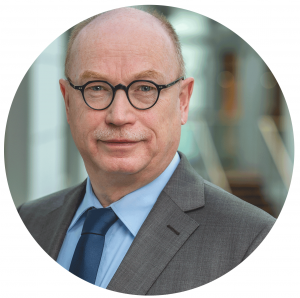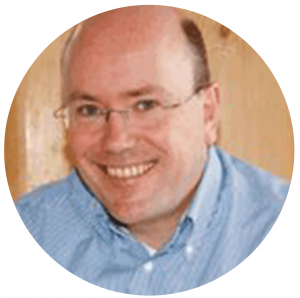Speakers 2018

Professor Dr. Martin Stratmann
President of the MPG
Max Planck Society – Status quo and future perspectives
Professor Dr. Martin Stratmann is a German electrochemist and materials scientist. He became President of the Max-Planck-Gesellschaft in June 2014, after serving as Vice President of the Society’s Chemistry, Physics and Technology Section since 2008. Following his German Habilitation in physical chemistry at Düsseldorf University in 1992, he became Full Professor at the University of Erlangen in 1994 and was finally appointed Director and Scientific Member at the Max-Planck-Institut für Eisenforschung in 2000. His main research interests were the atmospheric corrosion of iron and ferric alloys, as well as the de-adhesion of polymer coatings from reactive metallic surfaces. He paved the way for the development of synthetic coatings that can protect steels and other metals from rust and heal themselves when damaged. Amongst others, during his scientific career he was awarded the Otto Hahn Medal of the Max Planck Society, the UR Evans Award of the Institute of Corrosion, the HH Uhlig Award of the Electrochemical Society, which also appointed him a “Fellow”. He is member of the board of trustees of the Karl-Winnacker-Institute of the DECHEMA, as well as a member of acatech (National German Academy of Science and Engineering) and the Academy of Science and Art of North Rhine-Westphalia.
As President of the Max-Planck-Gesellschaft, Martin Stratmann is a member of the “Innovation Dialogue”, a body set up by the German Federal Chancellery, advising the Federal Government on science and technology.
He is Chairman of the Trustee Committee of the Körber European Science Award as well as member of the Trustee Committee of Deutscher Zukunftspreis (the German President’s Award for Innovations in Science and Technology), the Alexander von Humboldt Foundation and the Board of Directors of the Stifterverband.

Nicole Boivin
Director, MPI for the Science of Human History
Indiana Jones and the Relevance of the Past to the Present
Nicole Boivin obtained her BSc in Cellular, Molecular and Microbial Biology from the University of Calgary in 1992. Surrendering to a long-term interest in archaeology, she later began graduate studies in the Department of Archaeology at the University of Cambridge, earning an MPhil in 1996 and a PhD in 2001. Following post-doctoral fellowships in Cambridge and Paris, she took up a Senior Research Fellowship at the University of Oxford, where she is also a fellow of Jesus College. Nicole Boivin joined the Max Planck Institute for the Science of Human History as Director of the Department of Archaeology in July 2016.
Nicole Boivin’s archaeological research is multi-disciplinary, and cross-cuts the traditional divide between the natural sciences and humanities. She has undertaken pioneering research in Asia and Africa, exploring a broad range of issues through field, laboratory and theoretical applications – from human migrations out of Africa in the Late Pleistocene, to cognition, rock art and material culture. Her most recent project, the ERC-funded Sealinks Project, has investigated the emergence of long-distance trade and connectivity in the Indian Ocean, and its relationship to processes of biological exchange and translocation. She is interested in human history over the long-term, and the broad patterns of migration, interaction and environmental manipulation that have shaped the human story. At the Max Planck Institute for the Science of Human History, her work will seek to explore the entanglement of biological, cultural and ecological processes from prehistory to the present.
Nicole Boivin is author of Material Cultures, Material Minds: The Role of Things in Human Thought, Society and Evolution (2008, Cambridge University Press). She is editor of several books, most recently Human Dispersal and Species Movements: From Prehistory to the Present (in press, Cambridge University Press).

Hans Schöler
Managing Director, MPI for Molecular Biomedicine
A career committed to understanding early development
Hans Robert Schöler studied Biology at Heidelberg University and completed his PhD at the Center for Molecular Biology Heidelberg (ZMBH) in 1985. From 1986 until 1988 he worked as a research Group Leader in the pharmaceutical industry (Boehringer Mannheim, now Roche). This appointment was followed by three years as a scientific fellow at the Max Planck Institute for Biophysical Chemistry in Göttingen. From 1991 until 1999 he headed a research group at the European Molecular Biology Laboratory (EMBL) in Heidelberg. During that period, he completed his habilitation in Molecular Biology at the Biological Faculty of Heidelberg University in 1994.
From 1999 until 2004, Hans Schöler was Professor, the Marion Dilley and David George Jones Chair for Reproductive Medicine and Director of the Center for Animal Transgenesis and Germ Cell Research (CATGCR) at the University of Pennsylvania (PENN), School of Veterinary Medicine, Department of Animal Biology in Philadelphia, USA. Since 2004 he has served at PENN as an adjunct professor of Biochemistry.
Upon his return to Germany in 2004, he was appointed Director at the Max Planck Institute for Molecular Biomedicine in Münster, Department for Cell and Developmental Biology. He also is a Professor at the Medical Faculty of the Westphalian Wilhelms University in Münster. In addition, he is an Adjunct Professor at the Hanover Medical School (MHH) as well as a Distinguished Professor at Konkuk University, Seoul, South Korea. In 2010 the Ulsan National Institute of Science and Technology (UNIST) has opened the Hans Schöler Stem Cell Research Center (HSSCRC) in Ulsan, South Korea.

Kai Geschuhn
Innovative Services & Open Access, Max Planck Digital Library
Trends in Scientific Writing and Scholarly Publishing
Kai holds a master’s degree in Library and Information Science. At the Max Planck Digital Library, she works at the interface between license management and open access publishing services. She is part of the negotiating teams for Max Planck’s offsetting agreements and she promotes the OA2020, the INTACT project and the ESAC initiative aiming at the transition of the current subscription system to open access business models. Kai is coauthor of the MPDL whitepaper “Disrupting the subscription journals’ business model for the necessary large-scale transformation to open access” published in 2014.
http://orcid.org/0000-0001-5849-8751

Andres Rojas del Rio
Scientific Officer – Brussels office of the MPG
Grants of the European Research Council: Funding opportunities for Max Planck scientists
Of Chilean descent, born and raised in Germany, Andres obtained a law degree from the University of Hannover and became a lawyer in 2007.
Lobbyist for the German Business Association from 2008 to 2012 in Brussels, Andres gained a significant knowledge of the European policy mechanism. Since 2012 he has been advising on EU policy and funding opportunities at the Max Planck Brussels‘ Office.

Gaia Pigino
Research Group Leader, MPI of Molecular Cell Biology and Genetics
Transport and self-organized assembly in cilia
In 2002, Gaia received her master’s degree in natural science followed by a PhD in evolutionary biology – focusing on zoology and ecotoxicology. She then joined the electron microscopy laboratory of Pietro Lupetti for her first postdoctoral position before moving to Zürich. There, supported by an EMBO Long-Term Fellowship, she worked with Takashi Ishikawa at the Swiss Federal Institute of Technology and the Paul Scherrer Institute in Villigen. Since 2012 Gaia is an independent Group Leader at the Max Planck Institute of Molecular Cell Biology and Genetics in Dresden. Her group currently studies the assembly of the cilium by investigating the detailed 3D structure, the molecular arrangement, the protein composition, and the dynamics of the ciliary tip complex and of the IFT trains.

Hubert Klahr
Head of the Theory Group – Planet and Star Formation, MPI for Astronomy
Planet Formation at home and abroad: What made the Earth habitable?
Prof. Dr. Hubert Klahr leads the Theory Group in the Department for Planet and Starformation at the Max-Planck Institute for Astronomy (MPIA) and teaches Planet Formation and Numerical Methods for Physicists at the University Heidelberg. He studied in Karlsruhe, Germany and graduated in 1994 with a Diploma in Physics. In Jena he joined the Max-Planck-Research Group “Dust in Star Formation Regions” under Thomas Henning. He received his PhD in Astrophysics in 1998 with a thesis on dust accumulation in disks around young stars. He spend two years as a PostDoc at the University of California in Santa Cruz and in 2000 joined Willy Kley as Assistent at the University of Tübingen, where he later received his “Habilitation” in Astronomy and Astrophysics. In 2002 he moved to the MPIA and became tenured Research-Group Leader in 2007. In 2013 he was honoured as Distinguished Russell Severance Springer Professor at UC Berkeley.

Silke Sachse
Research Group Leader, MPI for Chemical Ecology
Elucidating olfactory coding mechanisms in Drosophila
Since 2016 Silke Sachse has been holding a W2 Research Group Leader position of her independent research group Olfactory Coding which is hosted by the Department of Evolutionary Neuroethology at the Max Planck Institute for Chemical Ecology in Jena. Her group identified crucial coding and processing mechanisms that enable an animal to decode and categorize the vast array of odors and to accomplish odor-guided decisions. Silke and her team are currently interested in whether the olfactory circuitry can be modulated by the internal state of the animal, previous experience and/or associative learning.

Anna-Maria Getoš Kalac
Head of the Max Planck Partner Group, MPI for Foreign and International Criminal Law
The ‚Balkan Homicide Study‘ in Context of‚ Criminological Capacity Building‘ in the Balkans
Prof. Dr. Getoš Kalac obtained her LL.M. and PhD in law at the University of Freiburg’s Faculty of Law, while conducting her criminological research on political violence and terrorism at the MPI for Foreign and International Criminal Law in Freiburg. After having obtained her PhD she was in 2012 granted a research leader position for the Max Planck Partner Group for “Balkan Criminology” – a joint venture of the Freiburg MPI and the Zagreb Law Faculty. Simultaneously she has been working since 2006 as assistant and since 2011 as assistant professor (Juniorprofessor) at the University of Zagreb’s Faculty of Law, where she got appointed to a tenured professorship in criminal (procedural) law, criminology and victimology in 2017. For the past six years her main area of interest has been the development and implementation of an innovative criminological research concept for Southeast Europe. With the ongoing expiration of the partner group her scientific aspirations have shifted back from ‘criminological capacity building’ in the Balkans to her roots in innovative and foundational violence and cruelty research.

Matthias Stein-Gerlach
Patent and License Management, Max-Planck-Innovation
Max Planck Innovation: Connecting Science and Business
Dr. Matthias Stein-Gerlach is the initiator and project leader at Max-Planck Innovation for the Drug Discovery & Development Centre of the Max-Planck Society. He is co-founder of Axxima Pharmaceuticals AG, Munich, and U3 Pharmaceuticals AG, Martinsried. After heading his own research group at Axxima, starting 1998, he became Director Business Development in 2001 and was appointed VP Business Development in 2002. In 2004 he joined Max-Planck Innovation as Patent & Licensing Manager.
He earned his PhD in 1998 in the lab of Dr. Axel Ullrich at the Max Planck Institute for Biochemistry in Martinsried. In addition, Matthias Stein-Gerlach has completed a 3 year education in finance and administration.

Sebastian Leidel
Research Group Leader, MPI for Molecular Biomedicine
What happens if cells cannot read well?
Sebastian Leidel holds a diploma degree in Biology from Heidelberg University. He conducted his PhD under the supervision of Pierre Gönczy at the Swiss Institute for Experimental Cancer Research (ISREC) in Lausanne (Switzerland) and obtained his PhD in Life Sciences from the University of Lausanne in 2005. Subsequently, he worked as a Postdoctoral Fellow and later lecturer at the Institute of Biochemistry at the ETH Zurich (Switzerland). Since May 2010 he leads the independent Max Planck Research Group for RNA Biology at the Max Planck Institute for Molecular Biomedicine. His research is focused on understanding the function of chemical RNA modifications and their role for the maintenance of protein homeostasis in response to stress, in development and disease. He was awarded an ERC Starting Grant in 2012 and the James Heineman Research Award in 2016. In 2019 his group will move to the University of Bern where he will be a Full Professor for RNA Biochemistry.

Marc Bickle
Service Leader, MPI of Molecular Cell Biology and Genetics
Good Scientific Practice: what are they and how to adhere to them
Marc Bickle obtained his PhD at the Biozentrum in Basel, Switzerland,
studying the immunosuppressive drug Rapamycin using yeast. He then went
to the LMB in Cambridge, UK, to study behavior in C.elegans. He then participated in the creation of Aptanomics, a drug discovery Biotech in Lyon, France.
He is currently heading the High Throughput Technology Development
Studio at the MPG-MPI in Dresden, Germany, developing RNAi and chemical
high content screens.

Jacqueline Tabler
Research Group Leader, MPI of Molecular Cell Biology and Genetics
Soft skills: authorships and cover letters
Jacqueline Tabler received her PhD at Kings College London in Developmental Biology. Between 2011 and 2016 she did her Postdoctoral Research Fellow at the University of Texas in Austin, which was funded by an NIDCR Ruth L. Kirschstein NRSA fellowship. In 2017 she became a Research Group Leader at the Max-Planck-Institute of Molecular Cell Biology and Genetics in Dresden. Her lab combines a novel ex-vivo live imaging technique, tissue mechanics, and mammalian genetics to understand how the skull grows.

Gunda Wößner
Senior Researcher, MPI for Foreign and International Criminal Law Department of Criminology
Soft skills: authorships and cover letters
Gunda Woessner is a psychologist and senior researcher at the Max Planck Institute for Foreign and International Criminal Law, Department of Criminology. Her professional background includes a professorship of psychology at the University of Applied Police Sciences Baden-Württemberg in Villingen-Schwenningen, Germany, and a position as research associate at the Clinic for Psychiatry and Psychotherapy, University of Münster, North Rhine-Westphalia. From 2008 to 2014, she was equal opportunity officer of the Institute and, from 2009 to 2014, equal opportunity officer of the Max Planck Society’s Humanities Section. She has published numerous peer-reviewed articles and book contributions in international volumes with a focus on sexual and violent offending, recidivism, and electronic monitoring.

Frank Steffen
Research Fellow, MPI for Physics
MADMAX – a new search strategy to identify axions as the dark matter in our Universe
My research interests focus on the quest for the potential particle identity of dark matter from a theoretical point of view. Since the year 2016 I am also involved with the MADMAX initiative/collaboration as a consulting theorist. The aim of this project is to test the well-motivated hypothesis of axion dark matter.

Florian Jug
Group Leader, MPI of Molecular Cell Biology and Genetics
Content-Aware Image Restoration and Quantitative Downstream Analysis
Dr. Florian Jug is a Group Leader at the Center for Systems Biology Dresden (CSBD) since March 2017. His research aims at pushing the boundary of what computer vision and machine learning can do for the automated and semi-automated quantification of biological image data. Florian was born in Kärnten, Austria but moved to Munich in 2001 in order to study Computer Science (with a minor in Logic & Philosophy of Science) at the TUM. He then moved on to Switzerland, where he obtained a PhD in the field of Computational Neuroscience from ETH Zurich in 2012. During his postdoc at MPI-CBG in Dresden, he started developing computer vision and machine learning algorithms to extract biologically meaningful information from microscopy data.

Kamal Asadi
Group Leader, MPI for Polymer Research
Store digital information in plastics
Kamal Asadi received his PhD degree in experimental solid-state physics from University of Groningen, the Netherlands. His PhD research work and patents contributed to the demonstration of the first organic ferroelectric memory array and its logic table. After a Post-Doc period at the Zernike Institute for Advanced Materials, he joined Royal Philips Electronics N.V. as a research scientist. His work at Philips was focused on the investigation of metal-oxides, ferroelectrics and graphene for opto-electronic applications. In 2014 he was awarded the Sofja Kovalevskaja Award of the Alexander von Humboldt Foundation for his project on organic multi-ferroics. His research at the moment is focused on novel electronic devices based on organic/inorganic hybrids for memory application.

Martin Vinck
Research Group Leader, Ernst Struengmann Institute in Cooperation with Max Planck
Unsupervised clustering of temporal patterns in high-dimensional neuronal ensembles using a novel dissimilarity measure
Martin Vinck obtained his PhD in neuroscience at the University of Amsterdam in 2013. After postdoctoral stays at the Department of Neuroinformatics at the Donders Centre for Neuroscience and the Department of Neurobiology at the Yale School of Medicine, in 2016 he was appointed as Research Group Leader at the Ernst Struengmann Institute in Cooperation with Max Planck Society in Frankfurt. Vincks research focuses on the nature of the neural code. He investigates how neurons efficiently encode information by making use of redundancies in the natural visual input, and how temporal patterns of neuronal population activity encode and transmit information. His lab combines optogenetics, i.e. activation or inactivation of specific cell types using expression of opsins and light stimulation, together with high-density recordings of many neurons simultaneously. In addition the lab develops mathematical techniques for the extraction of patterns from high-dimensional neuronal datasets.

Katerina Douka
Group Leader, MPI for the Science of Human History
FINDER: Discovering new human fossils from Eurasia using collagen peptide fingerprinting
Dr. Katerina Douka, is an archaeological scientist specialising in radiocarbon dating. Prior to joining in 2017 the Max Planck Institute for the Science of Human History as Group Leader, Katerina was based at the University of Oxford, UK, where she spent 12 years investigating aspects of human evolution, the timing of modern human dispersals across Eurasia and the demise of archaic human groups, such as the Neanderthals and Denisovans.
She is currently the Principle Investigator of the ERC-funded project “FINDER” that focuses on the discovery and analysis of new human fossils from Eurasia dating to between 200,000-10,000 years ago. Katerina’s work has featured in over 50 scientific articles, published by Nature, Science, PNAS and other journals.
